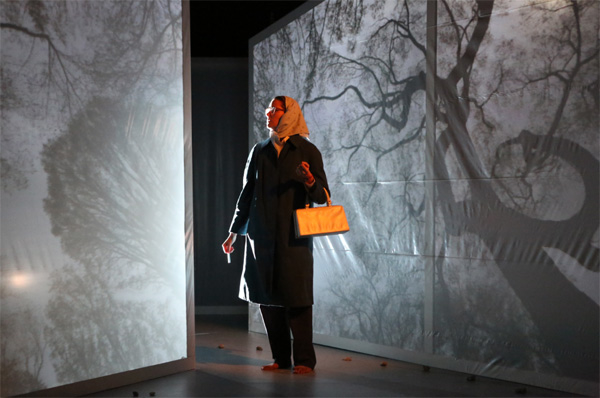Selma '65

(© Steven Schreiber)
A shadow slowly moves across a screen of dark and twisted trees. A figure emerges from behind, smoking a cigarette and looking around with ghostly deliberation. These are the opening, haunting moments from Catherine Filloux's new solo play, Selma '65, starring Marietta Hedges at La MaMa. They also happen to be the most memorable and visually arresting in this 75-minute production.
The title references the 1965 Selma-to-Montgomery marches that saw thousands of activists protest against Alabama's restrictive Jim Crow laws, which were designed to prevent that state's black citizens from voting. The Selma marches were a major milestone in the civil rights movement, undoubtedly contributing to the passage of the 1965 Voting Rights Act. Violent images of Southern police brutality were broadcast into American homes nightly, winning hearts and minds to the cause of civil rights. They convinced Michigan resident Viola Liuzzo to take action.
The play depicts Liuzzo ferrying teenage activist Leroy Moton back to Selma in her car. She's come down to Alabama from Michigan to help out with the marches. She chats with Moton before noticing that they're being followed by a truck full of Klansmen. Gary Thomas Rowe, a paid FBI informant, is one of the men in the truck. Hedges switches between playing Liuzzo and Rowe. Sometimes Liuzzo is in her car with Moton; other times she speaks to us from beyond the grave. Sometimes Rowe is talking with his FBI contacts; other times he is testifying before a Senate committee. Regardless, Hedges is always acting opposite an invisible scene partner, a difficult prospect at best.
Hedges does what she can, but she's left flailing under Eleanor Holdridge's sloppy direction. Often it is not exactly clear which character Hedges is embodying, with dialects fading in and out. While costume designer Suttirat Larlarb has provided archetypal accessories for the two characters in the play (a headscarf for Liuzzo, a busted Klan hood for Rowe), they are far from uniformly or clearly executed. Both characters exhibit the nervous tic of adding a little guffaw at the end of nearly every line.
Filloux and Hedges represent the unfortunate meeting of clunky writing and awkward diction: "Sh*t Muffin, I'm keepin' too many secrets," Hedges exclaims, affecting Rowe's good-ol'-boy Southern drawl. Presumably he's talking to a person named Muffin, but we never really get to know much about her or her relation to the story.
Filloux makes the mistake of assuming too much foreknowledge of these events and characters on the part of her audience. Hedges spouts off names and references relationships to her knowing invisible scene partners while we are left frantically trying to catch up, listening in like a fly on the wall rather than a captive audience.
This is a shame because Liuzzo's true story is an important but rarely discussed footnote in American history. Ample evidence suggests that the FBI made a concerted effort to defame Liuzzo after her murder while protecting Rowe from prosecution. The fact that Liuzzo is rarely discussed anymore indicates that, at least, their efforts to make this story go away have been successful. Selma '65 could have been an opportunity to teach this suppressed history to a new audience. Instead, it feels more like a sermon delivered to an ever-dwindling choir of those who remember.











